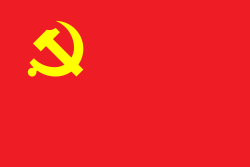Draft:Chinese Communist Party
| Oh no, they're talking about Politics |
| Theory |
| Practice |
| Philosophies |
| Terms |
| As usual |
| Country sections |
|
|
The Chinese Communist Party (CCP), also known as the Communist Party of China (CPC), is the sole ruling party of the China and the founder of the current Chinese republic ever since its victory over the nationalists under Mao Zedong. Founded in 1921 by Chen Duxiu and Li Dazhao, two Chinese university professors with a deep interest in Marxism, being aided in the founding of the party by the Bolsheviks in Russia. Several years after its founding, the party arose as part of the global communist movement occurring during that time and gained significant ground and steam after World War 2. Today, the party is controlled by Xi Jinping as the president (which is a misleading title, since he’s really more so the supreme leader of the party and the nation).
Today, the Chinese Communist Party is known for being a brutal authoritarian force exercising control over all of China, especially under the reigns of Mao Zedong (the chairman of China from 1949 until his death in 1976) and Xi Jinping (the current president of China since 2012). Since its inception, the party has evolved majorly from a genuine authoritarian communist movement to a communist in name only movement engaging in market capitalism with a “president” as the movement’s figurehead, imitating its western enemies and its Russian ally. [1]
Nationalist rivalry[edit]
World War 2 and the temporary alliance[edit]
Militant atheism and anti-religious sentiment[edit]
Internment camps[edit]
Ideological incoherence[edit]
Communist or fascist?[edit]
Authoritarian conservatism[edit]
"Neoauthoritarianism" is a practical ideology that governs the CCP, combining authoritarian political systems with conservative social policies and de facto state capitalist economic policies. It is often called "[Chinese] neoconservatism", but it has nothing to do with that of the United States. This is part of modern political Chinese conservatism.
The CCP was a solid communist before Deng Xiaoping, but after Deng Xiaoping, there is controversy over whether it is a 'communist party'. After Deng Xiaoping, traditionalist Chinese values were promoted, and patriarchal values, which had been oppressed during the Mao era, were revived, and today's Chinese society is not in favor of feminism and the LGBT movement. Although China is a CCP's one-party dictatorship, its labor rights record is very weak, not like a communist country that aims for a country for labors, and there is an extreme gap between the rich and the poor due to the wide recognition of private property.
See also[edit]
- Xi Jinping - the supreme leader of the party.
- United Russia - their functional Russian equivalent and counterpart despite not being communist.
- Communist Party of the Soviet Union - their Russian counterpart in the past.
- Communist Party of the Russian Federation - their Russian counterpart in the present.
References[edit]
- ↑ What’s ‘Communist’ about the Communist Party of China? Stanford University
